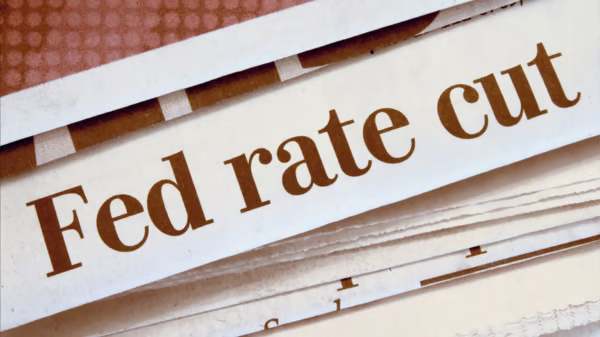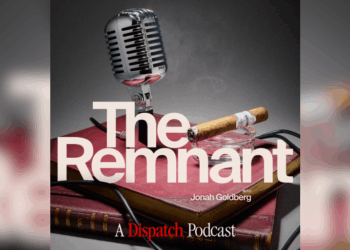Life, Liberty, Property #118: Another Shutdown Showdown
Forward this issue to your friends and urge them to subscribe.
Read all Life, Liberty, Property articles here, and full issues here and here.
IN THIS ISSUE:
- Another Shutdown Showdown
- Video of the Week: Media Spin Exposed: Left-Wing Violence & Censorship Uncovered — In The Tank Podcast #512
- Shrinking Government Requires Government Action
- Cartoon
Another Shutdown Showdown
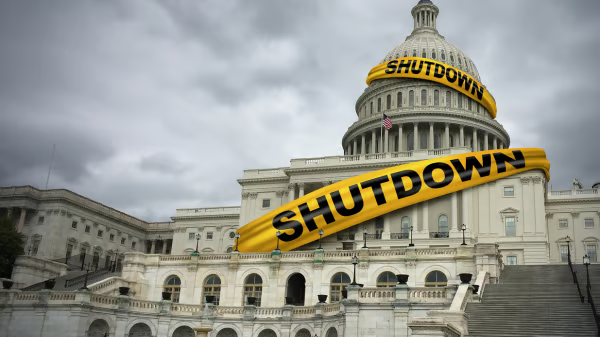
Congressional Republicans and Democrats are engaged in another government-shutdown showdown. Having received massive criticism (and abuse) from fellow Democrats after backing down while approaching a government-funding deadline last March, Senate Minority Leader Chuck Schumer (D-NY) is taking a hard line this time around, aided by his equally intrepid House counterpart, Rep. Hakeem Jeffries (D-NY).
The deadline is tomorrow, with a shutdown to arrive on Wednesday if the Senate and President Trump do not consent to a deal.
The House narrowly passed a GOP bill funding the government for seven more weeks at current spending levels. The bill was in line with reforms already passed in the One Big Beautiful Bill Act (OBBBA) enacted on July 4. Senate Republicans are considering the bill the House passed.
With a comfortable 53-47 majority but not enough votes to stop filibusters, the GOP will need some Senate votes from among Democrats and the two Independents to pass the bill to continue funding the government. Democrats view this as an opportunity to force concessions. Senate Democrats are demanding the restoration of $1.5 trillion in spending cuts established in the OBBBA, including the restoration of $450 billion in Obamacare spending reductions, reversal of Trump’s (minute) spending recissions, and a few other things that will likewise expand the federal government and shrink the economy.
The trade the Democrats are offering is simple: a massive, permanent increase in government spending for seven weeks of government funding.
Obviously, they are not going to get all that. Some Senate Republicans have expressed openness to restoration of the Biden-era expanded subsidies for Obamacare, which they certainly should not do, but of course they are Republicans and hence largely invertebrates. The Wall Street Journal reports:
Some lawmakers and aides on Capitol Hill think a bipartisan deal to extend ACA subsidies will be key to averting or ending a shutdown and have started informally discussing possible options.
Thune said that he was familiar with some of the conversations and could envision a potential deal on subsidies taking shape. If Trump weighs in, “there’s potentially a path forward here,” he said.
Trump agreed to meet with Democrat leaders early last week, then quickly changed his mind after hearing from Republican congressional leaders:
Senate Majority Leader John Thune (R., S.D.) and House Speaker Mike Johnson (R., La.) both spoke with Trump, according to people familiar with the matter, reiterating their stance that Democrats shouldn’t be trying to extract concessions over a short-term spending bill. Trump then said he had changed his mind and wouldn’t meet with the Democrats.
“I think the president probably is ready and willing to get involved, but I don’t think he nor any of the rest of us want to be extorted,” Thune said in an interview Thursday. “Just, let’s keep the government open and let’s have this conversation.”
Trump changed his tone entirely after the meeting, the story reported: “Trump called Democrats ‘unserious and ridiculous.’ Democrats accused him of throwing an ‘unhinged temper tantrum’ by reneging on the meeting.”
Not content with a verbal response, Trump and his team announced a counter move that would cause a shutdown to backfire very badly on the Democrats by reducing the federal workforce (nearly all of whom are Democrats) radically and permanently:
The White House moved to put further pressure on Democrats on Wednesday night, with Office of Management and Budget Director Russ Vought issuing a memo directing agencies to prepare plans to make permanent layoffs if funding lapses, on top of the typical furloughs that happen during shutdowns. …
Vought’s new Office of Management and Budget directive instructs agencies to put together reduction-in-force plans for employees who work for programs that lack current funding, have no outside funding source and that are “not consistent with the president’s priorities.” In a shutdown, workers deemed “essential” such as those tied to public safety, active-duty military personnel and air-traffic controllers would be required to work without pay. Congress typically provides back pay for those exempted workers and those who have been furloughed.
In an opinion piece on Thursday, Wall Street Journal editorial board member Kimberly A. Strassel explained just how disastrous the Trump-Vought response would be for the Democrats:
The true scope of this losing proposition came clear with a memo Mr. Vought, director of the Office of Management and Budget, issued Wednesday night, explaining how a shutdown will roll. Shutdowns usually mean furloughed federal employees, who suffer temporary inconvenience before resuming their jobs. Not this time.
The Vought memo orders agencies to identify all programs that depend on discretionary funding (which lapses next week) and don’t align with the president’s priorities. Employees who administer those disfavored programs or projects won’t be furloughed. They will be fired.
By forcing a shutdown, Democrats would give Trump the opportunity to shrink the government far beyond anything he and his team could have hoped for previously. Strassel writes,
For small-government advocates, the beauty of this is its reset potential. When government reopens, the Trump team will hire back the fewest possible statutorily required employees at programs it already wanted to cut. For a starter list, see the more than 45 Mr. Trump’s recent budget asked Congress to eliminate—among them the Economic Development Administration, the U.S. Interagency Council on Homelessness, the Legal Services Corp. And then there’s the Education Department.
No need to ask Congress now! “He’s not the king. He can’t just dictate,” Mr. Schumer groused on Wednesday. Except when Democrats let him, with a shutdown.
Thus, the consequences of a shutdown would fall overwhelmingly on the Democrats and their interest groups. Trump and the congressional Republicans have already immunized the programs that affect their own constituencies the most, Strassel observes:
This administration also has every incentive—and decent means—to lessen shutdown pain for average Americans while maximizing it for Democrats. The Trump team has already listed the programs that will continue regardless of shutdown: Social Security, Medicare, military operations, veteran benefits, border security, air-traffic control. The recent reconciliation bill helps ensure they function.
They additionally have the experience of 2018, when they weathered the longest shutdown in modern times—35 days—thanks to creative use of doctrines that allowed them to keep some discretionary programs ticking. The architect of much of that nimble maneuvering was Mark Paoletta, who in 2018 was OMB’s general counsel. He is back in that role.
Schumer thinks that the proposed layoffs will not last, Strassel notes: “Mr. Schumer brushed aside the layoff threat, claiming any firings would be ‘overturned in court.’”
Schumer’s court scenario, however, has multiple pitfalls.
One, although a carefully chosen lower-court judge would surely strike down the layoffs and order Trump to restore the workers, that decision would be instantly stayed by the appropriate appeals court or the Supreme Court and ultimately reversed.
Two, voters not related to or dear friends of fired government workers are exceedingly unlikely to mind the layoffs if “essential” (meaning popular) services continue and hence the firings don’t affect them noticeably. With a Republican administration in control of the federal government, the Democrats’ leverage is severely reduced because they cannot make the layoffs create much pain for the public.
Three, waiting around while the courts reach a decision and the government remains technically unfunded will put the blame for any inconveniences directly on the people who voted against a funding extension: the Democrats.
Four, having the courts confirm that the layoffs are legal would destroy any leverage for the Democrats in future shutdown faceoffs. Given item one above, the court strategy is a weapon that cannot be used more than once, in addition to its futility.
Jeffries’ reaction, in all its abjectness, was much more realistic than Schumer’s bluster: “Jeffries warned federal employees in Virginia that ‘mass firings’ were coming to ‘ruin your life,’” Strassel writes. Even more damaging for the Democrats is their obvious responsibility for the entire mess, as noted above. Strassel writes,
All the onus rests on Mr. Schumer, since it will take Senate Democratic votes to keep government running. Don’t be fooled: He knows well what a horrible idea this shutdown is. In March, he argued that to close the government would be a “gift” to the White House, since it would give Mr. Trump “carte blanche to destroy vital government services at a significantly faster rate,” and Mr. Vought the “keys to the city, state and country.”
It could all be for nothing anyway, for the Democrats. Although government shutdowns have often benefited Democrats politically, the effect does not last very long. “The next congressional elections are more than a year away, which could temper the impact of any shutdown in deciding who controls Congress,” the Journal story reports.
Further reducing the Democrats’ clout, the public appears to have tired of the donkey party’s passion for cataclysmic anarcho-tyranny. Trump’s approval rating is at 45 percent, the Republican Party at 40 percent, and the Democrats at 33 percent.
The far-left website Mediaite headlined its story on the latest poll numbers with this: “Republicans Mop the Floor With Democrats on the Economy and Immigration in Stunning New Poll.” The headline on USA Today writer Nicole Russell’s article on the poll results was “Polls show Americans don’t trust Democrats on crime, economy. And for good reason.”
Russell quotes CNN Chief Data Analyst Harry Enten on current political sentiments:
“Who leads on the economy? Republicans, by 7. Immigration, Republicans by 13. How about crime, a big issue for Donald Trump and the Republicans? Look at that, lead by 22 points. … Whatever Democrats are doing, it ain’t working. Republicans have the lead on all three issues,” Enten said breathlessly on CNN about a September Washington Post/Ipsos poll. Enten continued with a damning declaration of Democrats’ political status.
In addition, Republicans have passed Democrats in party registration and are continuing to pad their lead. The Hill reports:
Democrats are sounding the alarm on new data showing they are losing voters to Republicans across the country.
A devastating New York Times report Wednesday showed that of the 30 states that maintain voter registration records by political party, Democrats fell behind Republicans in all of them between the 2020 and 2024 elections.
In total, Republicans added up to 4.5 million voters compared to Democrats, creating a huge hole that could set Democrats back for years.
“I think it should be an alarm” for the party, Democratic strategist Eddie Vale [said]. “I think it’s a real problem.”
The weakness of Democrat voter registration confirms the poll numbers, the Hill story notes:
A Wall Street Journal poll out late last month showed Democrats’ popularity had hit the lowest point in 35 years, as 63 percent of voters had an unfavorable view of the party. At the same time, 33 percent of those surveyed held a favorable view.
The drop in voter registration for Democrats “matches what we see in the polls,” said Republican strategist Susan Del Percio, who does not support Trump. “People are unsatisfied with what the Democrats are offering.”
Most of the public understands that the past four years of massive overspending and debt accumulation by the Biden administration and its two years of Democrat congressional majorities were disastrous. They do not want a repeat of that. They also recall that the economy was shaping up nicely under Trump before the pandemic.
Democrats are negotiating from an extremely weak position based on past performance. The comparison with Trump and the Republicans is embarrassing to the Democrats, Russell writes:
As a second-term president, Trump has implemented changes to bolster the nation’s economy. The gross domestic product increased at an annual rate of 3.3%, and inflation has stayed below 3%. Gas prices have finally lowered, the interest rate for a 30-year fixed mortgage fell in August to its lowest in 10 months, and the Dow Jones Industrial Average and the S&P 500, which tend to fluctuate, hit record highs at the end of August.
Although the economy has been improving, there are weak spots that need attention, especially the slowdown in job growth, inflation still above the Federal Reserve’s target, rising consumer debt, and a stagnant housing market. That plays into the hands of the Republicans, whom the public trusts more on economic issues. The high profiles of open socialists among Democrat officeholders and candidates further undermine the party’s credibility on the economy.
If there is a shutdown and the economy starts to falter, voters will be tempted to blame it on the shutdown, at least in part. (A long shutdown would be good for the economy, but most voters do not know that.) Smart politicians (not necessarily principled ones) should be reluctant to raise their heads above the ramparts by making major changes at present. That is exactly what a shutdown would amount to, in voters’ minds.
The American people said the economy was the most important issue in the 2024 election, according to Gallup. The issue has slipped to second since the murder of popular conservative youth organizer Charlie Kirk, according to Ipsos. Undoubtedly, however, likely voters are still concerned about the economy, and the advantage in the shutdown battle will go to whichever party can successfully convince the public that the other side is more radical on the issues in contention. All the factors indicate that the Democrats are much more vulnerable in that regard.
Sources: The Wall Street Journal; The Wall Street Journal; USA Today; The Hill
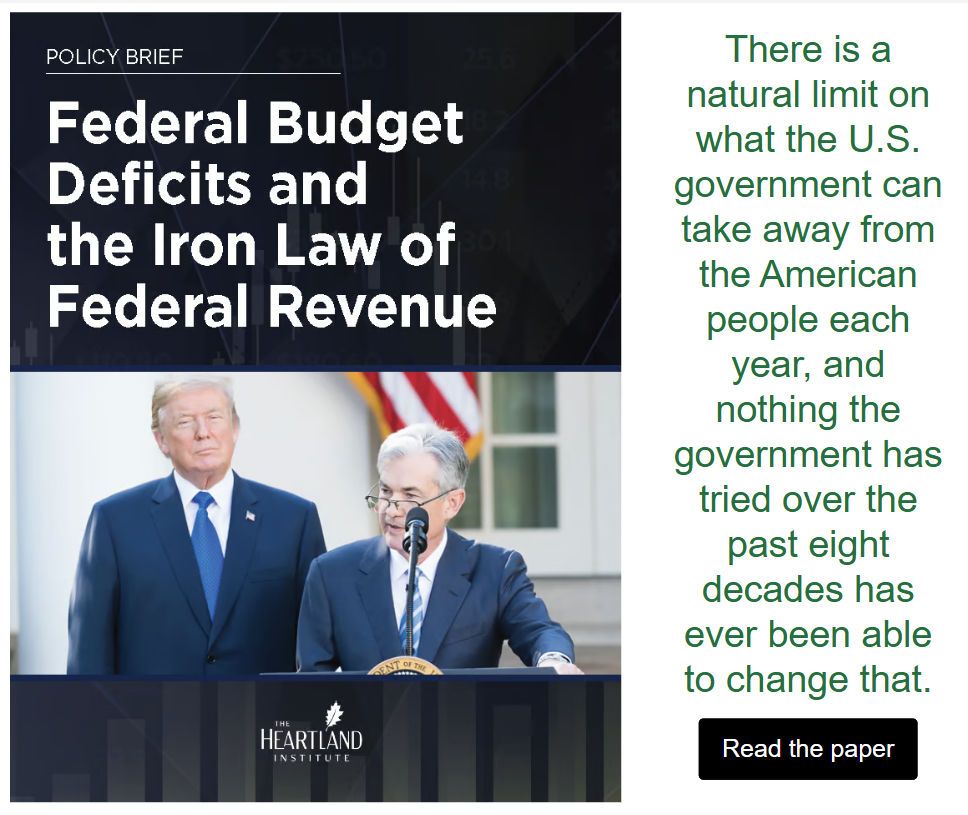
Video of the Week

The tragic assassination of Charlie Kirk is still having an impact on current public discussions about the radical left and their intolerance of dialogue and ideas that challenge the prevailing leftist dogmas. The media wasted no time trying to dismiss leftwing political violence as a “both sides” problem, but we know better. The Heartland Institute’s Eann Tang experienced how difficult it is to be a young conservative, especially on college campuses, but he is going to share why he holds on to hope and optimism for the future. We’ll also take a look at some very Unhinged behavior, talk about the folly of “both sides-ism” in the wake of leftist violence, and there seems to be reason to hope that Big Tech censorship of conservatives is beginning to wane.

Shrinking Government Requires Government Action
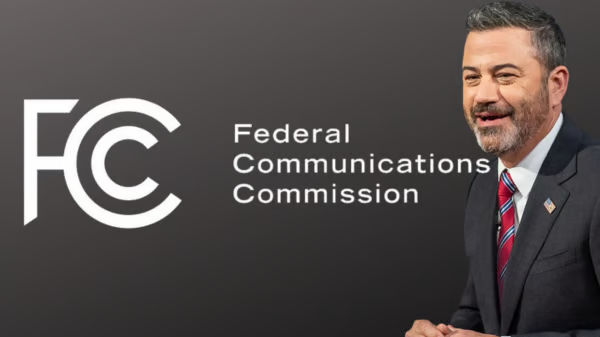
Free-market advocates regularly complain about government picking winners and losers. They are right to do so. (I use the word “they” so as not to include myself in the compliment.)
Where many of our allies in the movement have regularly gone wrong, however, is in failing to acknowledge just how deeply government favoritism is entrenched in the nation’s laws and regulatory web and how important it is to eliminate those biases without being overly punctilious about what initial steps we take in doing that.
What I mean by that is made clear in a Wall Street Journal article from last Thursday, in which the reporter explains the motives behind Nexstar Media Group President Perry Sook’s decision to stop running The Jimmy Kimmel Show on the corporation’s two-dozen-plus local broadcast-television stations across the country.
The reporter, Joe Flint, frames the story as an attempt to curry favor with the Trump administration, or at least to remove any unnecessary offense, as the Federal Communications Commission (FCC) considers Nexstar’s request for relief from current rules on the number of local broadcast TV stations a company can own. A reader could easily conclude that Nexstar is trying to exert undue influence on the federal government, an attempt at regulatory capture. The Journal reports:
The company owns and operates ABC affiliates in markets including Nashville, Tenn., New Orleans and Salt Lake City, and is in the process of seeking federal approval for its $6.2 billion acquisition of rival Tegna. Sook framed Nexstar’s deal for Tegna as a way for local stations to get a fair shake and better compete against tech companies and larger entertainment conglomerates.
To get the Tegna deal done, Sook needs the FCC to scrap rules preventing any company from owning TV stations reaching more than 39% of the country’s homes with televisions, and has lobbied the FCC for the change. Nexstar’s proposed acquisition of Tegna’s stations would give it reach into 80% of such U.S. households.
The rule on station holdings obviously transfers economic power from local stations to the TV networks. The rule has been in place for decades, since 1934. Throughout nearly a century, the FCC rule has given leverage to the enormous, now-multinational corporations that own the networks and reduced the influence of local stations over these companies’ decisions. That reduced local and regional influences over television programming.
Sook, 67, has seen the networks’ leverage strengthen throughout his career, the story notes:
When Sook started out in TV, the relationships between networks and affiliates were fairly straightforward. An affiliate typically gave most of its ad time to the network in return for content and financial compensation.
As more TV stations popped up and the competitive landscape changed, networks gained more leverage. Affiliates now pay the networks for content, in addition to giving up most of their ad time for network shows. Affiliates also share revenue they receive from pay-TV distributors that pay to carry their stations.
Sook is far from alone in his concern about the power imbalance, the story notes:
“The past three to four decades have largely been characterized by networks demanding and receiving financial concessions from their affiliate body. Rarely have affiliates possessed the leverage to fight back,” said Sandy Grushow, former Fox TV chairman.
Sook has complained to lawmakers and regulators about “the unbridled and ubiquitous reach of Big Tech and Big Media and the limits placed on the reach of local broadcasters,” the story notes. Sook told Nexstar shareholders in April that he had “made several trips to Washington, D.C., to push for regulatory changes that ‘level the playing field,’” the Journal reports.
The FCC is considering whether to lift the cap or perhaps eliminate it, with Sook having written in his April shareholder letter that “the prospect of meaningful broadcast ownership reform has never been better.” The Journal story suggests that Nexstar’s Kimmel decision is intended to influence the FCC’s deliberations on the station-ownership rule.
Perhaps it is, at least in part. The real story here, however, is the manipulation of markets and all aspects of American life that is so deeply embedded in the vast web of federal government rules and regulations. The government regularly uses that leverage to exert power over the media, which is clearly an unjustified distortion of an industry that has been a major factor in American life and a huge influence on public perceptions—and of course on voting habits.
The dismantling of the federal government’s enormous economic, political, and cultural manipulation machine is not simply a matter of “letting markets work,” and it has not been such for many decades. The nation’s “markets” are fundamentally distorted and controlled by government. They are not so much markets as mechanisms—mechanisms of increasingly centralized power and the corruption that it creates.
Advocates of free markets should resist the temptation to see potential FCC approval of the Nexstar deal as an example of regulatory capture or cronyism. It would be the very opposite.
Restoration of market discipline to the American economy will take an extensive program of active reform. Reflexive opposition to government action will only ensure that the government’s power over all things does not recede.
Source: The Wall Street Journal
NEW Heartland Policy Study
‘The CSDDD is the greatest threat to America’s sovereignty since the fall of the Soviet Union.’

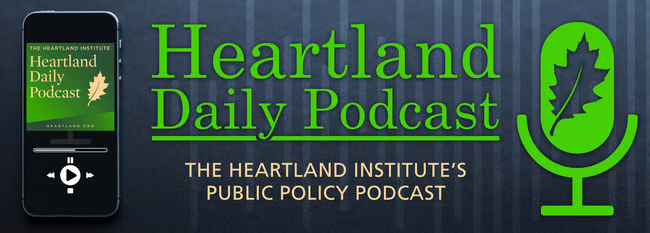
Contact Us
The Heartland Institute
1933 North Meacham Road, Suite 559
Schaumburg, IL 60173
p: 312/377-4000
f: 312/277-4122
e: [email protected]
Website: Heartland.org

